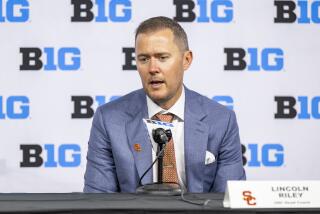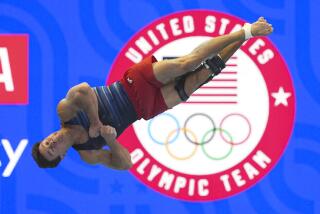Ready, Willing and Able : Reilly Rebounds From Suspension to Reach Olympic Boxing Trials
- Share via
Eight years ago, laser-thin, 12-year-old boxer Pepe Reilly--who looked more like a ring rope than a boxer--sat endlessly in front of his television in Glendale and watched as Evander Holyfield, Henry Tillman and other U.S. boxers fought their way into Olympic history at the Los Angeles Games.
“I thought to myself, ‘I could do that. I could fight in the Olympics. I could get that good,’ ” Reilly said recently.
Today, Reilly just might be that good.
This summer, he will get his chance to prove it.
He pounded his way into the U.S. Olympic trials--scheduled for June 10-12 in Worcester, Mass.--by winning the national Golden Gloves championships May 9 in Chicago, beating Pat Briceno of Vancouver, Wash., on a 5-0 decision in the 147-pound semifinals and then overwhelming Randy Carver of Grand Rapids, Mich., in a 5-0 decision in the final.
The Golden Gloves champion gets an automatic berth in the Olympic trials, in which Reilly must win four bouts to become a member of the Olympic team in Barcelona in July.
It will be his second trip to the Olympic trials. In 1988, at 16, he was invited but lost in the first round to Michael Carbajal, the eventual silver medalist in the Seoul Games.
“I was 16. I just wasn’t ready,” Reilly said.
Now, he appears to be ready. But the road has not been smooth for Reilly. In addition to the normal rigors of the most brutal of all sports, he was forced to take a detour down an even bumpier road last year.
Just days after achieving his greatest success--winning the U.S. Amateur title and being crowned the national champion at 147 pounds last June, Reilly was informed by the U.S. Olympic Committee that a routine drug test after the competition showed traces of the anabolic steroid Nandrolone in his system.
He was stripped of his amateur title and suspended from all USA Amateur Boxing Federation events for nine months.
Reilly and his father Fred, who serves as his manager and trainer, claimed the steroid came from a single injection he took months before the national championships, an injection administered by a friend and boxing trainer who, they say, told the Reillys it was an injection of only a legal vitamin.
“We had no idea what it was,” Fred Reilly said.
“I never would have taken such a thing,” the fighter said. “Never.”
That didn’t matter to the ABF. Despite an appeal, the suspension stood. And Reilly’s Olympic dream appeared to be shattered. But with the end of the suspension March 7, one route remained for Reilly to gain entrance to the Olympic trials.
“For nine months, all I thought about was the Golden Gloves tournament,” Reilly said. “I put everything else behind me. I trained hard for nine months for that one last chance.”
And then he took great advantage of it, punching his way through the Golden Gloves regional tournament at the Lincoln Park Gym in East L.A. in early April and then demolishing Briceno and Carver to clinch the title.
“I came back stronger than ever,” he said. “I was in control in the ring. I was able to move guys around whenever I wanted. I wasn’t always able to do that.”
Indeed, Reilly’s tiny frame as a youth did not change much as he became a teen-ager. He fought at 106 pounds in 1989 and at 119 pounds in 1990. Just a year later, he checked in at 147 pounds, and eyebrows went up. When he tested positive for steroid use, some said it was no surprise.
“A 30-pound weight gain in 12 months sounds about right for Nandrolone,” Dr. Robert Voy, the chairman of the ABF’s Sports Medicine Committee, said when the positive test results were announced.
Yet Reilly, who had been subjected to regular drug testing in the years before his suspension, had never before tested positive for steroids. A test in March of this year, when his suspension was lifted, also was negative.
“The weight gain had nothing to do with that shot,” Reilly, 20, said. “It was a one-time thing and had no effect on my weight. People forget that I also grew about six inches during those three years. The 147-pound division was where I belonged.”
At 5-foot-11, Reilly had a height advantage of several inches over all but one opponent--Briceno--during his romp through the Golden Gloves tournament. He is an accomplished boxer with fast hands, landing scoring punches in flurries. Reilly also is a crushing body puncher, somewhat of a rarity in amateur boxing in which all but the very best fighters hunt only the head, unwilling to step inside to deliver heavy punches to the body for fear of leaving themselves open to counterpunches.
Reilly has no such fear.
“Hitting the body is so important,” he said. “It just takes all the fight out of someone.”
Along with more strength and maturity, Reilly also brought a bit of apprehension with him after the nine-month layoff. He had sparred heavily every week, stepping in against accomplished professional fighters, including highly regarded lightweight Hector Lopez, also of Glendale.
But sparring and fighting are very different.
“The layoff from competition worried me,” Reilly said. “I wondered if my timing would be off. I was OK in sparring, but it’s always different in the ring. When you spar, you can relax. But in competition, you can’t relax. You only have nine minutes to get the job done. It counts.”
He need not have worried. In the finals in Chicago, he first took on Briceno and engaged the hard puncher in combat from the opening bell. Known more for his slick boxing style, Reilly stood and brawled, a tactic that shot up his father’s blood pressure in the corner.
“I wanted him to box, but he said he knew what he was doing,” Fred Reilly said. “Let’s say I was a little excited.”
Reilly had fought Briceno before and said he wanted to negate Briceno’s aggressiveness.
“He fights the same way every time,” Reilly said. “He backs everyone up. I wasn’t going to let him back me up. So I came out hard right from the start with heavy punches. And I got him to back up. I needed to know that I could do that.”
The confidence will help, he believes, as he heads into the most important summer of his life. “I’ve worked for this chance for a long time,” he said.
“Since the age of 12, this is what I thought about. And for the last four years, this is all I’ve thought about.
“This is for the Olympics.”
More to Read
Go beyond the scoreboard
Get the latest on L.A.'s teams in the daily Sports Report newsletter.
You may occasionally receive promotional content from the Los Angeles Times.









